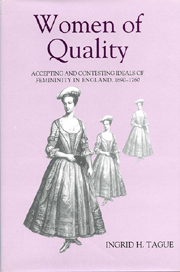Book contents
6 - Politeness and Sociability
Published online by Cambridge University Press: 12 September 2012
Summary
Just as consumption and fashion were seen as areas of particular feminine concern and expertise, so were the rituals of politeness and sociability that dominated much of elite life. Like fashion, sociability was both trivialized and seen as morally suspect. Didactic writers fretted over the wasted time supposedly represented by fashionable women's constant round of visiting, dining, and conversation. For them, female participation in such activities and the supposed uselessness of this behavior were mutually defining and reinforcing. The behavior was trivial and idle because it was feminine; it was feminine because it was trivial and idle. Yet many women of quality, even while they frequently drew on such discourse and joined in censuring fashionable idleness, also took politeness and sociability intensely seriously. The key to understanding this apparent contradiction lies in the role that sociability played in an elite culture that still relied greatly on polite rituals even as it increasingly applauded informality, openness, and sincerity. Sociability held enormous public implications and could transmit information about status or relationships of kinship and patronage – precisely because it was ostensibly unimportant.
Scholars widely recognize the significance of politeness in the eighteenth century; the term itself dominates histories of the period as it does those of no other. The concept of politeness has been seen as so important that Paul Langford gave his survey of the period the title A Polite and Commercial People. Lawrence Klein has devoted a full-length study to the philosophy of the third Earl of Shaftesbury, a philosophy that explicitly connected politeness and liberty to create a new Whig ideology.
- Type
- Chapter
- Information
- Women of QualityAccepting and Contesting Ideals of Femininity in England, 1690–1760, pp. 162 - 193Publisher: Boydell & BrewerPrint publication year: 2002



